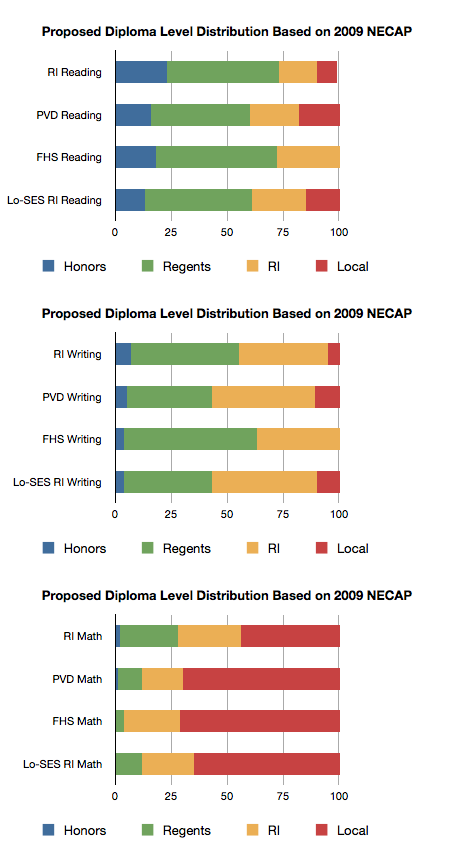ProJo:
Under the proposal, starting with the Class of 2012, students would be eligible to receive one of three diplomas, based on their scores on standardized tests in English and math, provided they also complete the required coursework and a portfolio or senior project.
Students take the tests, called the New England Assessment Program, in October of their junior year. The tests are challenging: Scoring proficient on the math portion, which covers algebra, geometry, statistics and probability, is roughly equivalent to scoring a B+ or better, according to state education officials.
Students who score “partially proficient” on the tests would be eligible for a “Rhode Island” diploma. Students who score “proficient” would receive a “Regents” diploma. Students who score “proficient with distinction” on the tests and do honors-level work across the board would receive an “Honors” diploma.
Students who fail to score at least partially proficient on the tests would be required to re-take the tests in their senior year. And schools would be required to offer additional supports along the way.
If a student fails to improve between junior and senior years, they would not be eligible to receive a diploma and would instead receive a “certificate.”
Setting aside a more substantive discussion of both tiered diplomas (which I regard as necessary in general) and the role of standardized tests in the process (which I think should be minimized), let's just look at the numbers here and think about the politics. Below is the percent of students who would be elegible for each level of diploma per test, based on the 2009 testing year data (RI=state, PVD=Providence, FHS=your favorite high performing high school closed for low performance):

Reading and writing are in the ballpark of the right spread of scores, with the idea probably being between the two. Math, not so much. Now, RI underperforms other states in math, but Vermont doesn't, and by this standard, 37% of all Vermont juniors and 56% of Vermont juniors eligible for free and reduced lunch would not qualify for a RI diploma. Whether or not this test in general is appropriate to the task, the current cut scores almost certainly are not.
And of course, if you have to pass all of them at the correct level to get credit, that cuts things down further (I can't find a detailed description of the proposal online).
I'm hard pressed to figure out who the in-state constituency for this decision is (the out of state audience is more obvious). To conservatives the multi-tier system looks like a cop-out; the direct and immediate problems are of course obvious to low income students, parents and their teachers; but beyond that, creating an "honors" diploma dependent almost entirely on a math test given at the beginning of 11th grade is likely to make many a competitive head explode in the suburbs. Your 2012 valedictorian may already have blown it.
Beyond that, while RI's large diversity of school designs serving low income students has produced a wide range of performance in the reading and writing NECAP's and other measures, nothing seems to make much of a difference in math scores, and it is difficult to imagine neighborhood schools under the best circumstances moving things more than, say, 20 points in the right direction.








